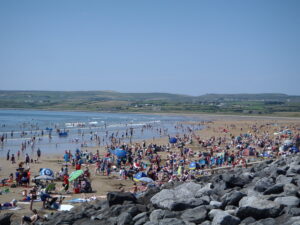
The overarching goal of the project is to carry out research which will underpin the Harnessing Our Ocean Wealth Strategy and the forthcoming National Marine Spatial Plan by describing, modelling and analysing the current state of the marine tourism and leisure sector and by proposing policy measures; thereby enhancing the competitiveness of the marine tourism and leisure sector. The research is framed with reference to the key features associated with an integrated approach to holistically sustainable tourism. With this goal in mind, the project is broken down into 4 key research areas:
- Review of Marine Tourism Strategies and Policies
- Spatial analysis of tourism and recreation activities in marine and coastal areas
- Balancing innovation, heritage and local community engagement when developing marine tourism initiatives
- Demand Models for Marine Related Tourism Activities
The project is carrying out a spatial analysis of tourism and recreation activities in marine and coastal areas in order to ensure they are considered in terms of Ireland’s National Marine Spatial Plan. Using business surveys, marine leisure enterprises are being linked to the coastal and marine features that they use to produce data and maps of not only marine tourism and leisure enterprises but also the key ‘blue’ assets, beaches, piers, cliffs, etc. that are used by such enterprises.
The project is also examining, through a case study, local community engagement with a key marine tourism initiative in order to examine what spill over effects are accrued from such marine related tourism projects and the lessons that may be learned to build other successful social enterprises based on ‘blue’ assets.
The project is also undertaking an international benchmarking desk study of popular marine tourism activity locations with similar climatic conditions to Ireland in order to identify possible new product offerings, new marketing approaches or alternative approaches to delivering existing marine tourism offerings.
Past marine and coastal tourism survey data are being used that has been collected by SEMRU under previous Marine Institute Awards and the EU Interreg MOSES project. To date this data has been used to examine expenditure and participations rates and a number of reports have been written up in this regard. In this project the same data of some 2700 individual tourists is being used to model the characteristics that influence participation in marine and coastal activities amongst overseas and domestic tourists in order to identify the profile of tourists undertaking such activities and to use same to make policy recommendations to broaden potential participant numbers.
Funded by


